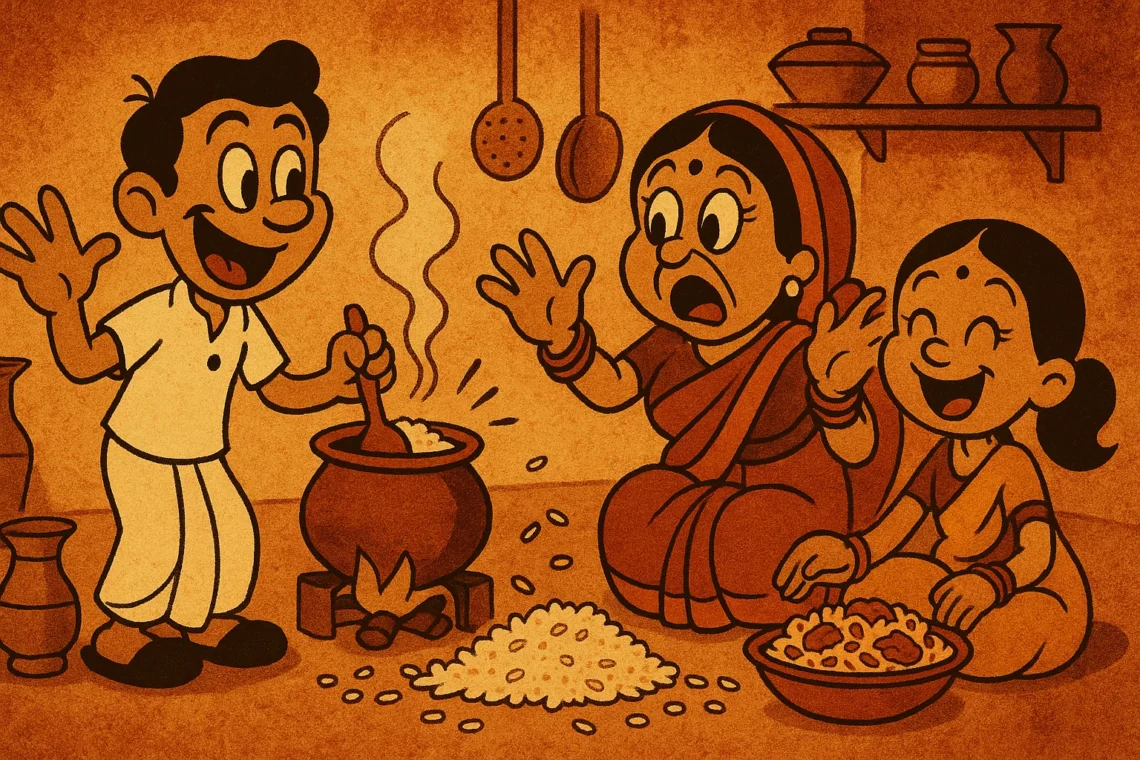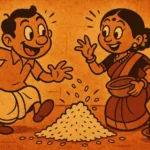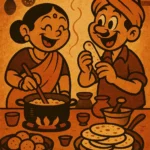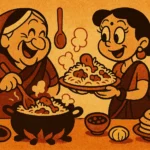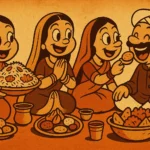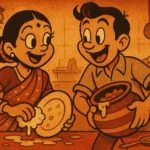Growing up in Mumbai, the kitchen wasn’t just where meals were made—it was a place of reverence, rituals, and, believe it or not, superstitions. My grandmother, with her wise eyes and a deep knowledge of every little kitchen habit, would always warn us, “Don’t spill the rice!” As a child, I’d never understood why spilling rice was such a big deal. Was it really that serious? In my head, rice was just rice—an essential, daily staple that seemed to appear at every meal without fail. But to her, spilling rice wasn’t just a minor accident. It was a bad omen, an act that could bring misfortune. As a young kid, this superstition didn’t make much sense to me, but the more I learned about the world of food and culture, the more I realized that food superstitions are deeply embedded in Indian kitchens, each with its own mythology, meaning, and mystery.
Food, in Indian culture, has always held much more significance than just what we eat. It’s tied to our beliefs, our rituals, and our connection to the divine. Superstitions surrounding food are as old as the traditions themselves—some rooted in ancient customs, some simply passed down through generations, like a tasty morsel of family folklore. The curse of spilled rice is just one example of how food can be steeped in magic, metaphor, and myth, often influencing the way we cook, eat, and even clean. Today, I want to take a deep dive into these kitchen superstitions and explore where they come from, what they mean, and why they continue to persist in the heart of our homes.
The Curse of Spilled Rice: A Bad Omen?
Let’s start with the most famous superstition in my family: spilled rice. This one was an absolute no-no. If rice fell from the pot or the serving dish, my grandmother would immediately throw a pinch of salt over her left shoulder to ward off the bad luck, and she’d mutter some ancient-sounding prayers. It was always done in a hurry, like it was a race against time to prevent something terrible from happening. But what did it really mean? Why was spilled rice treated with such gravity?
The roots of this superstition are tied to the belief that rice is a sacred and pure food—considered to be a gift from the gods. In Hinduism, rice holds a spiritual significance. It is often used in religious rituals, offered to gods during pooja, and is even used as a symbol of prosperity. To spill rice, then, was considered disrespectful, as it was seen as wasteful. Wasting food, especially something as sacred as rice, was believed to invite bad luck. This superstition is further compounded by the belief that rice has a divine connection, which is why spilling it might disrupt the balance between the earthly and the divine. Some even say that spilling rice is an omen of financial misfortune—perhaps because rice has always been a staple of life, and wasting it means wasting the essential resources that sustain us.
In a more practical sense, this superstition might also have originated from a time when rice was much harder to obtain, and wastage was a serious concern. Rice was (and still is) a prized commodity in many parts of India, and spilling it would have been a waste of something valuable, especially in poorer times. However, as with many superstitions, the deeper meaning has been lost over time, and what remains is the ritual—the salt over the shoulder, the prayers, the little acts of protection.
The Legend of the “Pooja Plate” and Its Special Handling
Another superstition that’s deeply rooted in kitchen culture involves the “pooja plate”—the plate used for offering food to the gods during prayers. You don’t just place any plate in front of the gods, oh no. The pooja plate is treated with utmost care and respect, and you must never, under any circumstances, allow the plate to be touched or disturbed once it’s placed on the altar. If you do, you risk angering the gods, and that’s a serious matter.
The origin of this superstition is closely linked to the idea that food for the gods is sacred and must be treated with reverence. In Hindu culture, food is often seen as an offering that connects the devotee to the divine. By offering food, you are not just satisfying hunger, but invoking blessings. The pooja plate, therefore, is more than a simple vessel—it’s a conduit for the divine. Disturbing it, either by knocking it over or placing it wrongly, was believed to disturb the divine connection and could result in bad luck. These kinds of superstitions are tied to the deeper belief in the power of food and the connection it creates between the human and the divine.
The Evil Eye and Food: The Role of Salt
Salt is another food item closely tied to superstitions in Indian kitchens. From the moment we’re born, salt is used to ward off the evil eye and bad energy. A pinch of salt is often placed on the forehead of a newborn, sprinkled around the house to ward off negative energy, or added to food to protect the eater. This goes back to ancient practices where salt was thought to have protective properties, believed to absorb evil spirits or negative energy.
The use of salt as a purifier or as a shield against bad luck also extends to the kitchen. If food is served and someone’s bad intentions are suspected (like an argument during dinner or someone criticizing the food), it’s common to throw a pinch of salt over your left shoulder or under the table to neutralize the bad energy. It’s almost like a food-based exorcism. While this might seem strange to outsiders, in Indian culture, food’s power to protect and heal isn’t just symbolic—it’s part of the fabric of daily life. Salt, in this context, is more than seasoning; it’s a safeguard against the unseen forces that might disrupt the harmony of the home.
Food as Metaphor: The Influence of Bollywood
Food and superstitions aren’t just confined to our homes—they also find their way into Indian films, especially in Bollywood. Think about the elaborate feasts in films like *Mughal-e-Azam* or *Kabhi Khushi Kabhie Gham*, where food is symbolic of wealth, status, and family unity. The way the camera lingers on the lavish platters of biryani or the gleaming silver trays piled high with sweets is no accident. These meals are metaphors for something much larger—connection, legacy, and often, unresolved family drama.
Food in Bollywood movies is rarely just about satisfying hunger—it represents the intricacies of relationships and the emotions tied to them. And like in the superstitions we hold in the kitchen, food becomes a powerful symbol of control, desire, and power. A meal shared in a movie often becomes the backdrop to pivotal scenes, where the act of eating can signal love, conflict, or even betrayal. In many ways, the exaggerated importance of food in these films mirrors the role food plays in our lives: it’s not just a physical necessity, but a deeper metaphor for life’s twists and turns.
The Magic and Myth of Food
Kitchen superstitions are a fascinating part of Indian culture, filled with symbolism, magic, and lessons passed down through generations. From the curse of spilled rice to the sacredness of the pooja plate, food is far more than just nourishment—it’s a language of the divine, a bridge between the earthly and the spiritual. While these superstitions may seem trivial or outdated to some, they remind us of the deep connection food has to our beliefs, our culture, and our identity. And even in a modern world where these myths may be forgotten, they continue to shape the way we approach food, family, and life itself.
Born in Mumbai, now stir-frying feelings in Texas. Writes about food, memory, and the messy magic in between — mostly to stay hungry, sometimes just to stay sane.

